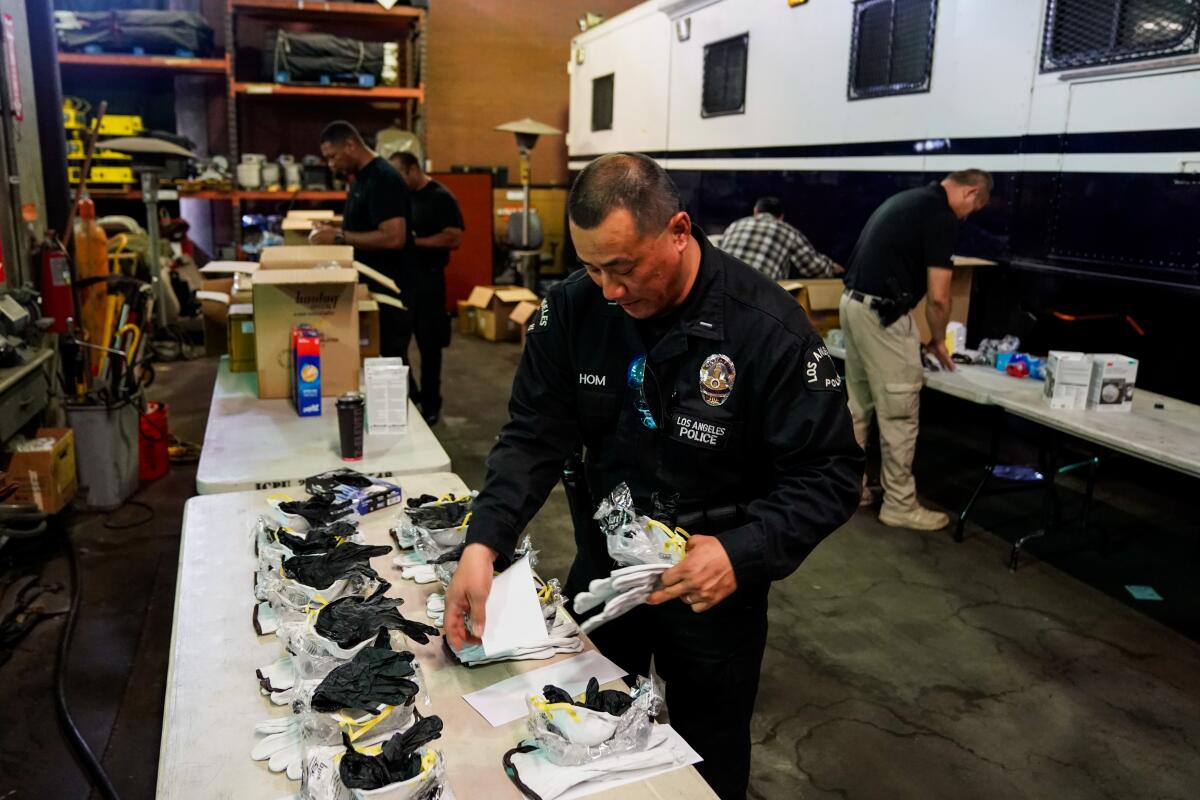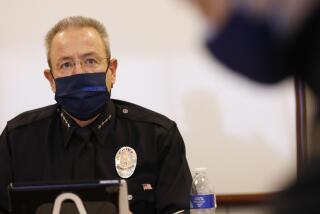Coronavirus has authorities putting more police on streets, releasing inmates from jails

- Share via
Coronavirus is bringing changes in the way Los Angeles law enforcement operates.
Local authorities stress they are not responding to more crime. Rather, they want to get more officers in place to help during the crisis while also keeping first responders safe. The Los Angeles Police Department on Sunday confirmed its first coronavirus case. The supervisor in the Pacific Division felt ill and went home Monday, officials said.
Here is what we know:
More boots on the ground
The Los Angeles Police Department will shift half the detectives working in its community stations to daily patrol in order to ensure public peace.
Mayor Eric Garcetti made the announcement Monday evening, saying that the city’s detectives will start working on the streets to “help supplement our patrol officers.”
Some detectives already are out there, the mayor said, to “make sure that any challenges that arise in our neighborhoods and grocery stores” are dealt with and to help people “feel secure in the city.”
LAPD Assistant Police Chief Robert Arcos said the move would provide at least 300 additional officers to patrol, and potentially more.
The moves comes after L.A. County Sheriff Alex Villanueva shifted deputies in other units to beat patrols to allow the department to prevent problems at places such as Costco, where large crowds of shoppers often wait.
Changing operations
On Wednesday, all the LAPD’s community police stations will be closing their front desks and walk-up service.
“Instead of going to your local area station, we are asking the public to use unique email addresses assigned to each of our 21 area front desks. Those emails will be monitored 24/7 and routed to the proper channels,” said a statement from the department.
The department plans to continue to answer and send officers on patrol calls.
Jails and prisons
The Los Angeles County Sheriff’s Department is releasing inmates from its jails and cutting down on how many people it books into custody to protect those housed in close quarters.
Villanueva said deputies and police officers across the county have been directed to cite and release people whenever possible, instead of arresting them, and to seek medical clearance before booking anyone who shows symptoms. Countywide, he said, arrests have dropped from a daily average of 300 to 60, while the jail population was reduced by more than 600 inmates.
“Our population within our jail is a vulnerable population just by virtue of who they are and where they’re located,” Villanueva said Monday at a news conference in downtown L.A. “So we’re protecting that population from potential exposure.”
The move came amid mounting calls by civil rights advocates and health professionals to reduce the number of people held in local, state and federal lockups. They raised concerns about the mayhem a COVID-19 outbreak could create within the prison and immigration detention system, which had been criticized for lacking sufficient capacity to meet inmates’ medical needs even before the pandemic.
San Quentin State Prison has put some 1,800 inmates in quarantine after reports of flu-like illnesses within two cell blocks. One of those is the reception unit where new prisoners arrive from jail.
Prison officials said no inmates have tested positive for COVID-19, but also confirmed that for most inmates, the department’s new protocol requires the results of a flu test to be obtained first, and if that is negative, there is a potential four-day wait for coronavirus results. However, the policy directs that prisoners 65 or older or those with chronic medical conditions should be considered for immediate COVID-19 testing.
Precautions
The LAPD has been taking precautions to deal with the spread of the coronavirus.
All patrol officers and officers likely to come into contact with infected people have been issued a kit consisting of multiple sets of gloves, a bacteria protection mask and goggles.
Officers are directed to use all three items when responding to a call or when making contact with a possible virus patient.
The department has already ordered 100,000 extra masks, but officers will not wear masks as a routine matter.
More to Read
Sign up for Essential California
The most important California stories and recommendations in your inbox every morning.
You may occasionally receive promotional content from the Los Angeles Times.













